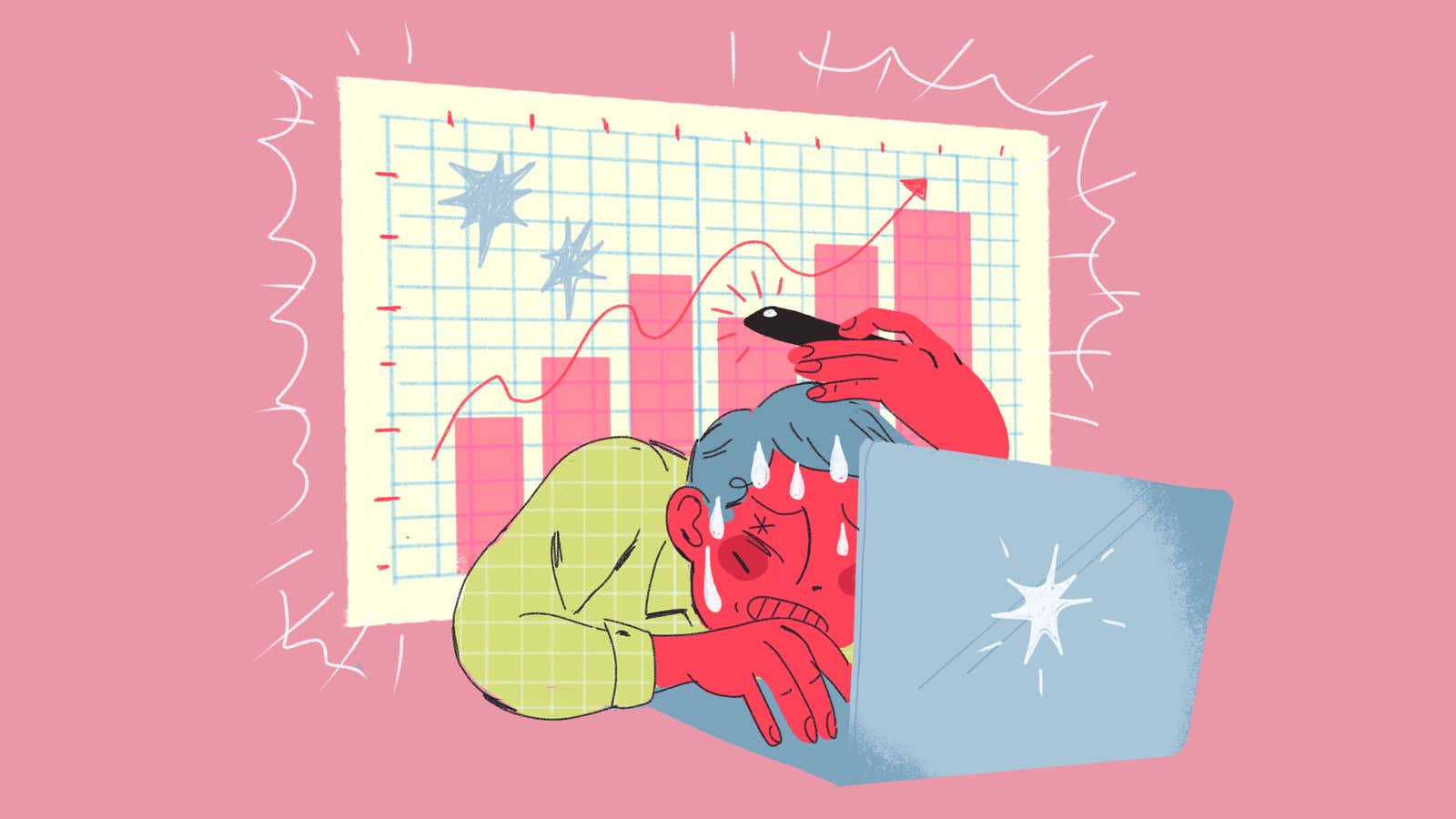“I wanted to be a workplace therapist. In fact, I studied social work because I thought work was so broken. I kept thinking, Why are people always so shitty at work?”
Morra Aarons-Mele knows how to touch a chord—maybe even more so when she talks about her own way of being in the workplace.
“This was the pre-mentorship era, when it was just sink or swim. So I learned that I had to work differently,” said Aarons-Mele. “I had to work flexibly because of my anxiety. Because I’m an introvert. Because I also get depressed.”
While consulting, Aaron-Mele had clues she was onto something. People’s eyes widened when she spoke about anxiety and how it impacted their work. After the launch of her Anxious Achiever podcast in 2018, her flooded inbox showed her people were hungry for more. Enter Morra Aarons-Mele’s new book: The Anxious Achiever: Turn Your Biggest Fears into Your Leadership Superpower.
Quartz at Work: With anxiety up from 2022, how can we “make friends with it,” as you suggest?
Morra Aarons-Mele: We have to have a relationship with our anxiety. We can’t tamp it down, ignore it, or control it because that’s when we act out. But where does that anxiety go? Sometimes it goes into micromanaging people and driving your team absolutely off the wall. Sometimes it goes into an obsessive need for control. It can often go into how you eat and take care of yourself.
Anxiety has to go somewhere. And it’s when we don’t address it, that it becomes our enemy. Listen to your anxiety—it’s trying to tell you something. You don’t have to do what it tells you, but you need to listen to it. So in that sense, we have to have a relationship with our anxiety. I think anxiety can be our friend. It’s hard work when we listen to it, but it helps us realize something needs to change. We can reflect and ask: Am I being a perfectionist? Is this deadline unreasonable? Am I being unreasonable? Could I work a little bit less to counterbalance that?
You suggest we pay attention to our “triggers and tells.” How might these historical patterns impact our work life and performance?
We all get triggered all the time at work. And people are activated differently. Learning your triggers is really important because you probably can’t control them from happening, but maybe you can control how you respond to them.
The “tells” then are our typical ways of responding and are specific to the person. Perhaps you get imposter syndrome. Some people get body experiences like vertigo, headaches, and loss of appetite.
Let’s take salary negotiations as an example. You’re likely anxious. Maybe the person you’re negotiating with triggers you, which happens often. Then we pay attention. How are you reacting? Will your tells help or hurt you in the negotiation? Maybe you talk too much like I do when I get anxious—I get very chatty. So you can prepare for the negotiation and not speak without a plan.
How do you think work itself contributes to or causes anxiety for workers?
Something really interesting about this moment is that we have such a scary macro-climate. There’s so much ambient anxiety, and we have a lot of anticipatory anxiety, given we just lived through a global trauma. And then we go back to work, and people are just acting out their anxiety back and forth.
Leaders and managers need to just take a breath and reflect: Why am I anxious? Why is it showing up? How is it showing up? If I responded differently, would I be happier? Would my team be happier? Could changing some of my reactions have a really powerful effect on others? I can’t change the global economy; I can’t change layoffs. But I can show up at work and be more mindful.
What’s the obligation of a leader in building out infrastructure for the team and individuals?
Taking care of yourself is serious for a leader. Because when you show up in the meeting and you’re really anxious or irritable, that will affect everyone else on your team. You have a responsibility not to fix it all yourself, but to be self-aware. And that’s the number-one leadership quality. When you’ve been vulnerable with yourself, and ideally, you’ve asked for help from your team, they’ll feel safer around you. Then you can help them get what they need.
Leaders who know themselves know that they have certain vulnerable areas. For example, let’s look at money. If you know that money is very triggering for you, seek out the person on your team who’s really objective and cool about money. So that when you’re feeling as if everything is failing, or whatever your money story is, you can tell a more neutral, objective story. That’s leadership.
Energy for your emotions
🦸🏻 What Marvel and Abraham Lincoln can teach you about performance
🐦 Scientists are trying to predict anxiety and depression with Twitter
👐 Workers want more support for their mental and emotional well-being. 3 ways leaders can take action
😷Social media spreads your emotions like they’re a contagion
You got The Memo
Send questions, comments, and stories of anxiety at work to aoakes@qz.com. This edition of The Memo was written by Anna Oakes and edited by Gabriela Riccardi.
